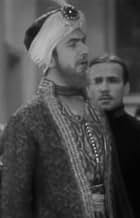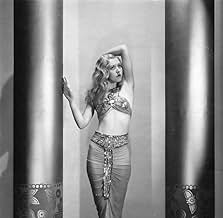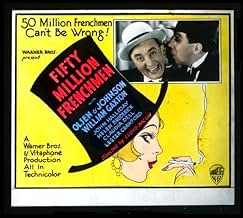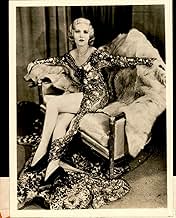Ajouter une intrigue dans votre langueWealthy Jack bets friend Michael he can woo Lu Lu without money within 2 weeks. Michael hires inept detectives to stop Jack, leading to comedic misadventures as Jack pursues Lu Lu while hidi... Tout lireWealthy Jack bets friend Michael he can woo Lu Lu without money within 2 weeks. Michael hires inept detectives to stop Jack, leading to comedic misadventures as Jack pursues Lu Lu while hiding his penniless state.Wealthy Jack bets friend Michael he can woo Lu Lu without money within 2 weeks. Michael hires inept detectives to stop Jack, leading to comedic misadventures as Jack pursues Lu Lu while hiding his penniless state.
- Réalisation
- Scénario
- Casting principal
- Simon Johanssen
- (as Olsen)
- Peter Swanson
- (as Johnson)
- Lu Lu's Mother
- (non crédité)
- Minor Role
- (non crédité)
- Jealous Husband
- (non crédité)
- Effete Bar Patron
- (non crédité)
- Minor Role
- (non crédité)
- Orizon - Magician
- (non crédité)
Avis à la une
The basic thread of the story is not a bad one. A rich ne'er do well American playboy in Paris, Jack Forbes (William Gaxton) well financed by his industrialist father to stay as far away from the family business as possible, sees Lu Lu Carroll (Claudia Dell) and falls instantly in love. Michael Cummins (John Halliday) says that he is also interested in her. He bets Forbes that he cannot win the girl's heart without any of his money as a means to impress her and take her places. If Forbes wins, Cummins will pay him 50 thousand dollars. If Cummins wins the bet, Forbes will pay him 50 thousand dollars. In the meantime, Forbes must make his living any way that he can, starting with no money or letters of credit in his pocket.
Warner Brothers, in just another year or two with better performers, could have made this work as a pretty decent precode. The main problem is the large part that Olsen and Johnson have in this film. Their part is that Cummins hires them to make sure that Forbes doesn't cheat and borrow money off of anyone. They're just not funny and Johnson's incessant hyena-like laughter gets old in a hurry. Show me you're funny, don't TELL me you're funny! Make this about Forbes and his creative attempts to survive and impress the girl given that he has no money and no contacts in a country that is foreign to him, and this could have been interesting. Instead the focus is Olsen and Johnson and their juvenile and archaic attempts at humor.
The few interesting spots include Helen Broderick as someone who hires Forbes as a guide and Bela Lugosi as a mystic.
* 1/2 (out of 4)
Your tolerance level of Ole Olsen and Chic Johnson will certainly determine how much you enjoy this comedy from director Lloyd Bacon. In the film they play two dumb Americans who find themselves in Paris trying to track down a certain woman. Along the way they manage to drive many people crazy including the viewers of the film. 50 MILLION FRENCHMEN is a pretty bad movie on several levels. I understand that comedy is very subjective but the Olsen and Johnson routine just didn't win me over here. In fact, I thought it was quite annoying at times and especially the Johnson laugh, which just made me want to throw myself in front of a moving bus. Even if you do enjoy their routine you're still going to be left with a rather poorly made movie. This was one of those early talkies where it's clear that most of the people involved just didn't know what they were doing yet. Just check out the opening scene with the woman and watch her performance. She's all over the place and appears to be looking off camera at the director trying to get some sort of help. Others throughout the cast also appears to be struggling in front of the camera but it doesn't stop here because the cinematography is bad and the entire film just has a very cheap look. Bela Lugosi fans might want to skip through some of the film to find his uncredited performance. It's funny to note that this film opened the same date as Dracula.
Back to Olsen and Johnson. Although this team is practically unknown today, they were quite successful on stage and made a few movies. Most of the ones I've seen were only fair, but their film "Hellzapoppin" is a terrific comedy. "50 Million Frenchmen" is NOT brilliant--mostly because Olsen and Johnson's material is pretty bad. Too often they weren't very funny and were quite corny--and the team laughed uproariously like every line was hilarious...which only reinforced how unfunny they were. In fact, the entire film is flat and unfunny and has not aged well. My feeling is that the film would have been much better without the comedy OR if they gave up entirely on the plot and just had a lot of zaniness (which is exactly why "Hellzapoppin" was such a good film). The other problem is that the film is simply too talky--as if the folks making the film didn't really understand the new medium of talking pictures.
Look carefully at Orizon the Magician. Underneath the beard and the costume, that's Bela Lugosi! He made this bit appearance before making his breakout film, "Dracula". However, as "50 Million Frenchmen" was held about a year before it was released, it turned out both films were released the same day back in 1931!
*While musicals were THE rage in the very early days of talking pictures, within only a couple years, the genre was pretty stale and box office receipts for these films dropped. So, while the Best Picture Oscar went to "Broadway Melody" in 1930, but around 1931 the films appeared to be passé. Because of this, studio execs ordered all the songs removed from "50 Million Frenchmen" before it was released. By about 1933-34, musicals were suddenly popular once again. Why the change? I have always assumed it's because the sound technology improvements enabled the musicals to sound a lot better and weren't inhibited by primitive microphones and flat sound. Additionally, the studios simply refined their style and plots enough that they once again were appealing to Depression-era audiences.
Warner Bros. Had bankrolled the 1929 Broadway original of this production, but by the time it went before the cameras in August 1930 the public had had enough of musicals and the studio in desperation completely cut out the Cole Porter score (only 'You Do Something to Me' is heard on the soundtrack as incidental music) and instead tried to turn it into a vehicle for Olsen & Johnson. After pretending it might just all go away, Warner Bros. Eventually slipped it into cinemas in February 1931 where it swiftly died at the box office (although it was released abroad still with its songs intact, in a version now lost).
At least in 1931 the thing was in Technicolor, but now lacking even that embellishment it just looks cheap and tawdry and the hotel setting stagey and drab. (The most obvious remaining evidence that it was ever in colour is a joke by Johnson about a parrot blushing, and the heavy makeup worn by leading man William Gaxton). Gaxton has been saddled with playing that tired old cliché, a millionaire playboy talked into temporarily giving up his millionaire lifestyle for a wager; not that the film does much with the idea.
For anybody hoping for pre-Code raciness, the humour is just coarse, with a creepy amount of lingering on ladies' underwear; and the gruesome sight of Olsen & Johnson modelling a pair of nighties. Several other reviewers have already commented on Johnson's laugh; which grows on you like fingernails down a blackboard. Bela Lugosi makes a fleeting appearance as a magician; but if you blinked you'd miss him.
Le saviez-vous
- AnecdotesThis was originally a Cole Porter musical, but the songs were omitted from the film because box-office receipts for musical films at that time were down.
- GaffesWhen Jack realizes he lost Lu Lu's phone number, she had just gone into her hotel a few seconds earlier. Considering how very anxious he was to connect with her, Jack should've had no qualms about simply following Lu Lu inside and asking for a replacement card, especially since the film later implies that Jack was also staying at that hotel.
- Citations
Jewish Tourist's Wife: Mister, will you kindly tell us where is the house of Victor Hugo?
Jack Forbes: Victor Hugo, the man who wrote the movie "The Man Who Laughs"?
Jewish Tourist: Yes.
Jack Forbes: I never heard of him.
- ConnexionsReferences L'homme qui rit (1928)
Meilleurs choix
Détails
- Date de sortie
- Pays d’origine
- Langues
- Aussi connu sous le nom de
- Fifty Million Frenchmen
- Lieux de tournage
- Société de production
- Voir plus de crédits d'entreprise sur IMDbPro
Box-office
- Budget
- 484 000 $US (estimé)
- Durée1 heure 14 minutes
Contribuer à cette page


































